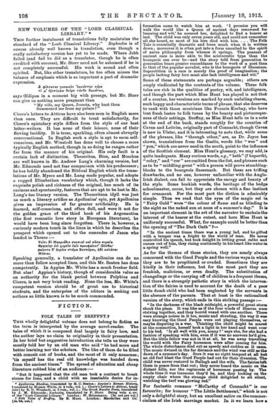NEW VOLUMES OF THE " LOEB CLASSICAL LIBRARY." *
This further instalment of translations fully maintains the standard of the "Loeb Classical Library." Sophocles is of course already well known in translation, even though a really satisfactory version has yet to be made. Where Jebb failed (and fail be did as a translator, though he is often credited with success), Mr. Storr need not be ashamed if he is not completely successful. His work is sound and often spirited. But, like other translators, he too often misses the balance of emphasis which is so important a part of dramatic expression.
Cicero's letters to Atticus have also been seen in English more than once. They are difficult to treat satisfactorily, for Cicero's epistolary style differs from the style of our beat letter-writers. It has none of their leisure, none of their flowing lucidity. It is terse, sparkling, often almost abruptly
conversational. In English such a style is apt to seem selfconscious, and Mr. Winstedt has done well to choose a more typically English method, though in so doing he ranges rather far from the manner of his original. His only fault is a certain lack of distinction. Theocritus, Bion, and Moschus are well known in Mr. Andrew Lang's charming version, but Mr. Edmonds need not fear comparison with his predecessor ; he has boldly abandoned the Biblical English which the trans lations of Mr. Myers and Mr. Lang made popular, and adopts a rugged Elizabethan vocabulary which, though it lacks the exquisite polish and richness of the original, has much of its raciness and spontaneity, features that are apt to be lost in Mr. Lang's too literary version. The Theocritean idyll was just as much a literary artifice as Apollonius' epic, yet Apollonius gives an impression of far greater artificiality. He is
learned, self-conscious, and often dull, and were it not for the golden grace of the third book of his Argonautica (the first romantic love story in European literature), he would have been long since forgotten. There is, however, a curiously modern touch in the lines in which he describes the prospect which opened out to the comrades of Jason who
landed in Thrace :
Tar, &i Mattptdaer tocortal Ka) wars repeal! enittins ?Pi xepoir icar wpovtatver' ibiolat• Oceirero ilepoSEY crrojectBoolrapos, 13i Kokauntt M &Nat.
Speaking generally, a translator of Apollonius can do no more than follow accepted lines, and this Mr. Seaton has done competently. In Appian Mr. White has a much fresher field. But alas ! Appian's history, though of considerable value as an authority for the blank period between Polybins and Cicero, is not very brisk reading. None the less, Mr. White's competent version should be of great use to historical students, and the enterprise of the editors in seeking out authors so little known is to be much commended.






































 Previous page
Previous page